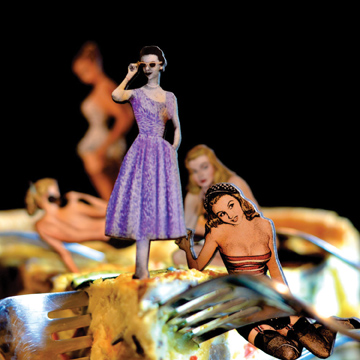5 Lesbians Eating a Quiche

This play has gained a strong following in North America, and both its first and second performances were sold out. So buy your tickets quickly. Every audience member is given a woman's nametag on entry. You may be called out by it during the show. At one point, everyone is a lesbian. Why is Joanie there a lesbian, an actor may ask the audience - I saw her pushing a lawnmower!
This play is a farce. It's meant to be ridiculous, but yes, there are many deeper truths brought to the fore along with the humour.
What was 1956 like for a white lesbian; that is one subtext. The play starts with 1956-era elements like the omnipresent fear of nuclear war juxtaposed with the cult of female domesticity. Whose quiche will win the cookoff, with the winning entry being served for the Susan B. Anthony Breakfast for the Sisters of Gertrude Stein?
The cooking contest is a commonplace mechanism for encouraging competitive domesticity. The winner of the quiche contest, Vern (short for Veronica), is a true caretaker at heart. She has designed an impeccable fallout shelter, at which the meeting is conveniently held. Vern is a seamstress, who does not mind mixing business with pleasure when she measures up pantsuits. But Vern is just one of five diverse and hilarious characters.
The society members refer to each other as widows. What exactly is "widow" a euphemism for, when most or all of the society members have never been married? Soon this question is asked directly, laying bare decades of flowery linguistic workarounds.
The play is chuck-full of not too subtle double entendres. Speaking of a woman who has been unceremoniously drummed out a few years ago for a grievous culinary offense, the ladies ask what sort of society member wants to put sausage - horrors, meat! - in a quiche - that pure vehicle of egg? If real men don't eat quiche (a title of a banal 1980s book), real lesbians don't eat quiche with meat.
Why the constant references to eggs? It has to do with the society's founder, an avid homesteader. The specific feminine attributes of eggs are hinted at, but not specifically described.
Is a strong, independent, homesteading woman synonymous with lesbian? Perhaps that is one stereotype, but another society member is described as a porcelain doll, albeit one with incredible sprinting ability. With five different characters, and various mentions of other society members, it is clear lesbians cannot be stereotyped.
Don't think too much about plot points, such as whether someone who is a self-declared sister of Gertrude Stein would also find the word lesbian unspeakable; that may have been the case after all in 1956. The play features several plot twists that may or may not shock, but the humour continues in a snappy and continuous fashion throughout.



